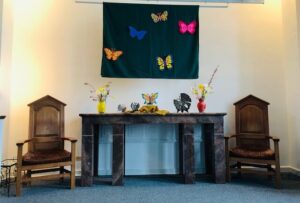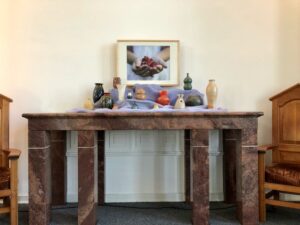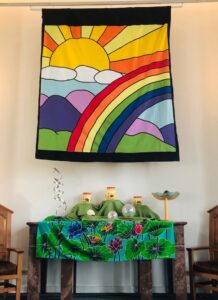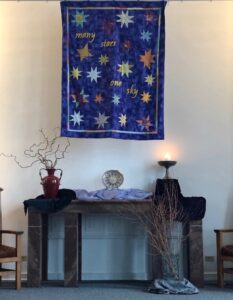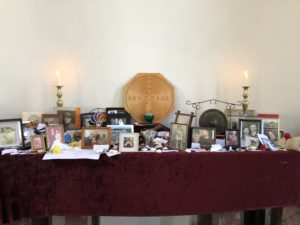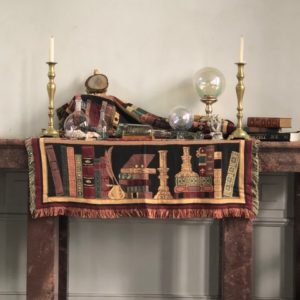“A River of a Rock”
Rev. Tim Temerson & Mary Beth Wiley
Unitarian Universalism affirms the “free and responsible search for truth and meaning.” But what exactly do we mean by religious or spiritual truth? Where do we search for truth and how do we know if we’ve found it?
A family-friendly space to participate in worship is available in the social hall. All are welcome!
CLICK HERE for our covid safety protocols.
Text of the Sermon
Rev. Tim Temerson
I want to begin this morning with one of the most frequently heard statements made about Unitarian Universalism. This statement is offered by some as a reason to celebrate our faith while others cite the exact same statement in pointing out what they perceive to be a serious flaw in Unitarian Universalism. Here’s the statement.
“In Unitarian Universalism you can believe whatever you want.”
I’m curious, how many here have heard this statement before or perhaps offered it themselves when trying to describe or explain Unitarian Universalism?
For those who offer this statement as a compliment to Unitarian Universalism, our faith tradition is all about freedom – the freedom to seek, to explore, to question, and to believe what your heart and mind tell you is true. And that freedom at the heart of our faith is best exemplified by Unitarian Universalism’s rejection of creeds and of any test of faith that one must accept in order to become a UU.
For those who point to this same statement in order to criticize Unitarian Universalism, I think it’s fair to say that they view religions like ours as being too individualistic and too subjective. The absence of a creed that we UUs view as being a positive strength is, in fact, a glaring weakness because people need to anchor their lives in an over-arching truth about the meaning and purpose of existence.
Now, at this point I could easily launch into a freedom good, creeds bad sermon But I want to do something a little different today. Rather than simply celebrating our commitment to religious freedom and our rejection of creeds and doctrines, I want to take some time to explore with you the philosophical and theological roots of our approach to religion and especially our understanding of religious truth. Too often in Unitarian Universalism, I think we skip over this step, instead jumping right to “we don’t like creeds” or “we can believe whatever we want” without ever taking the time to understand why.
So let’s begin with this whole question of religious truth. What exactly is it and where does it come from? Is there one truth, many truths, or no truth at all? And why exactly do we Unitarian Universalists reject creeds? Is it because we simply don’t agree with the specific content of existing creeds or is it because there is something about creeds in general that doesn’t fit with our understanding of the nature and origins of truth?
As we consider these questions, I want to begin with a story from the Jewish tradition, and more specifically from the Talmud. I first encountered it in a class I took in seminary on the history and development of the Judaism and if there is one thing that really stood out to me about the class and about the Jewish tradition as a whole, it is the way Judaism approaches religious truth and meaning.
And that approach is beautifully captured by the story. A legal dispute between two rival religious schools (the House of Hillel and the House of Shammai) has been going on for many years. After arguing back and forth with no end in sight, the two sides eventually appeal to God to resolve the dispute. God listens to the arguments on both sides and eventually decides that while both make arguments that are true, the House of Hillel prevails because it has made its arguments with humility and openness, and has listened to and learned from the truths contained in the arguments made by the other side.
Think for a minute about what the story is telling us about the nature of truth. Truth is not found in just one argument, in just one belief, or on just one side. Rather, truth emerges in the interaction of different ideas and diverse perspectives. God rules on behalf of the House of Hillel because while the other side only listened to themselves and to their own ideas, the House of Hillel listened to and learned from the wisdom of the other.
And as I came to learn in that class, this spirit of ongoing and continuous studying and questioning, argument and conversation, is at the heart of the Jewish understanding of religious truth. While Judaism recognizes and affirms the sanctity and sacredness of the Torah, the truth in the text only emerges out of the continuous exploration and interpretation of its meaning. That’s why so much of the Jewish tradition is a vast and continuous dialogue among different voices and commentators – a dialogue that both reveals the truth as it is understood at a particular moment in time and that is always laying the groundwork for future generations to develop new truths and new ways of understanding God, the world, and humankind.
One of the best illustrations of this very Jewish approach to truth is the structure of the Talmud itself. Take a look at this image of a page from the Talmud.
I hope you are able to see the different shaded portions of the page. In the upper center is a pink shaded area of text. That is a single point of law made in what is known as the Mishnah, which is a Jewish legal text written around the year 200 of the Common Era. But like the Torah, this point of Jewish law demands interpretation and more interpretation. The truth in the text is not simply found in the legal language. It is also found in the conversation about the text. So this page from the Talmud does not just contain the point of law. It also includes the conversation about the particular point from various Jewish commentators. Each differently colored column is a different commentator interpreting this particular point of law. And that is what I find so fascinating and inspiring about the Jewish approach to religious truth. Because truth emerges out of conversation, questioning, and interpretation, the Talmud includes both the point of law and the conversation about its meaning.
And it is this understanding of and approach to religious truth that inspires the title of today’s sermon – “A River or a Rock.” For those faith traditions rooted in a single creed, doctrine, or belief, religious truth resembles a rock – solid, unmoving, and unchanging. Truth is like a piece of property that one faith can claim and own to the exclusion of others. But for traditions like Judaism and, as I will argue, Unitarian Universalism, religious truth resembles a river of continuous and ongoing revelation, interpretation, and conversation – a river that never stops moving and that is always creating deep and profound truths out of the interaction of countless ideas and voices. Religious truth, therefore, can never be fully or definitively found in just the words of one person, one sacred text, or even one religion because truth is always emerging, always unfolding, always carrying us along a marvelous journey of discovery and exploration. After Scott and the choir share a wonderful anthem, the second half of my sermon will focus on Unitarian Universalism and the nature of truth.
Part Two
In the first part of this morning’s sermon, I distinguished between two approaches to religious truth – the rock or property model which sees religious truth as being a single belief or set of beliefs that are eternal and unchanging and that belong exclusively to only one religion, and a river or pluralistic model that sees religious truth as a moving and evolving reality that emerges out of the interaction among a wide variety of influences and ideas, experiences and stories, conversation and dialogue.
It is this understanding of religious truth that informs Unitarian Universalism. From our beginnings almost 500 years ago during the Protestant Reformation right up to the present day, Unitarian Universalism has been rooted in an understanding of truth that is open, continuous, pluralistic, and diverse. We see truth as living in and emerging out of all things and all people. Religious truth lives in sacred books like the Torah, the Koran, and the Bhagavad Gita. Religious truth lives in the rhythms, regularities, and processes of nature and the universe. Religious truth lives in the words and deeds of prophetic and spiritual leaders like Gandhi, Martin Luther King Jr., and Mother Theresa. Religious truth lives in the creative imagination – in music, in the visual arts, and in works of literature and poetry. And religious truth most certainly lives in all of you – in your experiences, your stories, your joys and your sorrows, your hopes and your dreams. There is no limit, no end, no boundary or barrier privileging one source of truth over another. In Unitarian Universalism, truth lives in and is revealed in everything.
I don’t know if many of you are familiar with what is called the Living Tradition of Unitarian Universalism. The Living Tradition is a list of six sources of religious and spiritual truth lifted up as being especially important for Unitarian Universalists. Here is a somewhat abbreviated version of that list.
Of course, this list of sources is not complete or exhaustive. No perfect or all-inclusive list exists or can ever be fully written in Unitarian Universalism. But what matters most is not how complete or exhaustive our list of sources is or can be. Rather, what matters most is that the river is always flowing, always moving, always revealing new sources, new ideas, and new truths.
And it is this reality of truth as evolving and emerging out of the diversity of life itself that explains why we Unitarian Universalists do not have a single creed or dogma. Reality is simply too diverse, too mysterious, too complex, and too dynamic to be captured by one statement, by one belief, by one text, or even by one religion. Our problem with creeds isn’t that they are wrong; a creed, in fact, is one more source of spiritual truth and wisdom. Our problem with creeds is that they are absolute and not reflective of the dynamism and diversity of creation. With a creed, truth is final and the conversation is closed. In Unitarian Universalism, truth is never final and the conversation never ends.
And that leads me back to that statement about Unitarian Universalism being a religion in which you can believe anything you want. I think our commitment to truth as an always unfolding and ever-flowing river, to truth as the living product of the interaction of an infinite number of sources and of an unending conversation has led some, including quite a few Unitarian Universalists, to conclude that when it comes right down to it, Unitarian Universalism is so wide open, so inclusive, and so free that we lack anything resembling shared truth. In Unitarian Universalism, when it comes to truth it is basically every person for themselves.
Well, I’m here to tell you that nothing could be further from, well, the truth. You see, in addition to sharing with the Jewish tradition an unending commitment to the search for truth, we also share with Judaism a belief in the existence and authority of a particular kind of religious truth – truth that emerges not from a single creed but rather from the agreements and promises we make with one another. You see, in both Judaism and Unitarian Universalism, truth is covenantal rather than creedal.
When we say that Unitarian Universalism is a covenantal rather than a creedal faith, it simply means that we UUs journey together, guided not by a single creed written in the distant past but instead by a set of agreements about what we believe and how we will live. That is essentially what a covenant is – a set of promises or agreements human beings make with one another. Of course, covenants, like all agreements, are subject to review and revision. Covenants change as new ideas, new needs, and new realities emerge. But even though they are subject to change, covenants, and especially religious covenants, are affirmations of deep and profound truths – truths that can be just as meaningful and just as important as any creed.
The truth that lives in our covenants defines and shapes who we are and how we live as Unitarian Universalists. Our covenants lift up and affirm beliefs and values that guide us as people of faith. Think for a moment about the most important covenant in Unitarian Universalism – the covenant that affirms our seven Unitarian Universalist principles. Here are those principles, which Rev. Leia talked a great deal about last Sunday.
These seven principles are a reflection of who we are as people of faith. They emerged out of a long and continuous dialogue among Unitarian Universalists about our most deeply held beliefs and convictions. The Seven Principles are reviewed from time to time and can be changed. And, as Rev. Leia discussed last week, there is a proposed Eighth principle that is currently being discussed and that has been adopted by over 200 UU congregations. But while the content of these principles will undoubtedly change in the future, today they serve as an affirmation of our deepest truths and convictions and as a stirring call to live our lives as a shared journey rooted in those things we believe and value most – love and freedom, compassion and justice for all people and for this planet.
So the next time you find yourself having a conversation about religion or what church you attend, I hope you’ll share something of our approach to and understanding of religious truth. I know that summing up Unitarian Universalism in a sentence or two (the so- called “elevator speech”) is never easy because we don’t have a creed. But don’t mistake our lack of a creed for an absence of truth or conviction. We have beliefs, we have convictions – we have deep and lasting truths. Of course, the truths we affirm today may someday change and are never carved in stone. But as people of faith, we find meaning and inspiration in the journey those principles challenge and inspire us to make – a journey that calls us to listen, to learn, and to grow, and that challenges us to build a world that is free and fair and just not only for ourselves but for the whole human family. Those are our truths, our principles, our values. May they bring us meaning and purpose, hope and joy, this day and every day.



